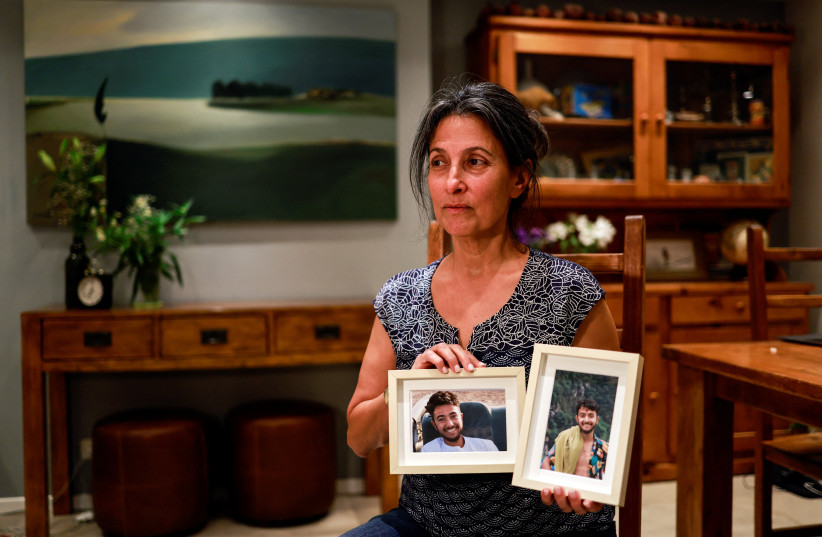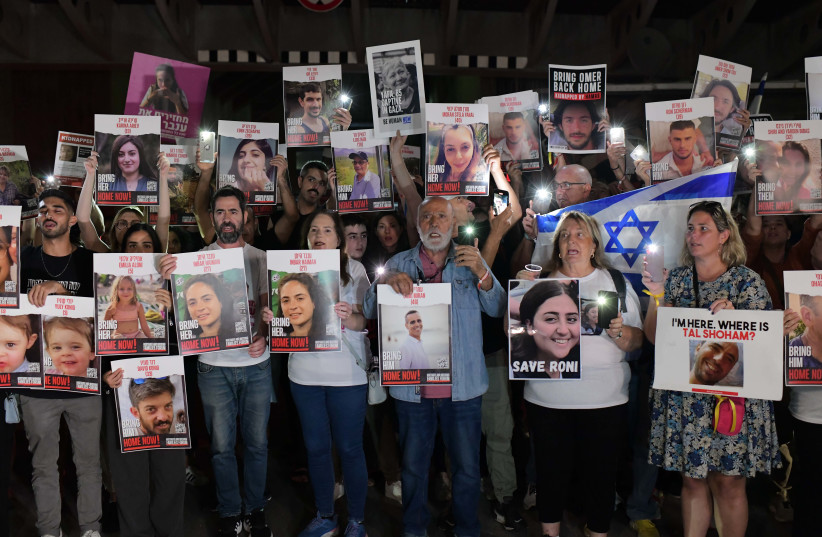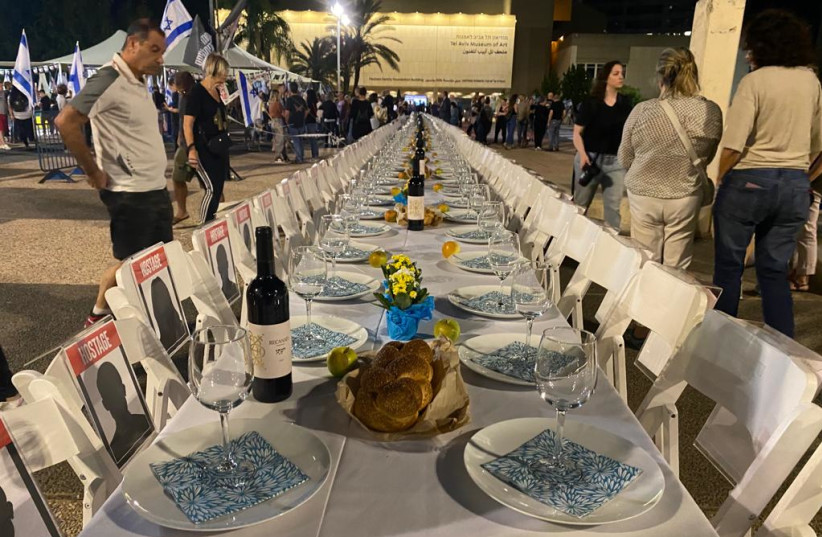A simple “I love you” text on a Saturday morning was the first ominous warning note.
Rachel Goldberg-Polin realized that she had entered a nightmarish universe.
The second text stating “I am sorry,” from her 23-year old son Hersh who had been at a music festival in Reim by the Gaza border, almost seemed to cement that sense of dread.
“I immediately knew that something horrible was unfolding in my world,” Rachel told a small group of reporters in New York on Tuesday as she stood outside the United Nations Security Council chamber.
Her son, who like herself, holds dual American-Israeli citizenship, is among the 222 held hostage in Gaza since the Hamas assault on southern Israel on October 7.

'Where is the world?'
She knows from eye-witness testimony that his arm was blown off in the attack and that he managed to bandage it with a tourniquet before Hamas drove him into Gaza in a pickup truck.
“Hersh’s last cell phone signal was found inside of Gaza at 10:25 in the morning on October 7.
“Since then we have been given a video showing Hersh getting into that truck with a bloody stump here his left arm use to be,” Rachel said.
Since the October 7 attack in which Hamas also killed over 1,400 civilians and soldiers, the Security Council has struggled to find common language to condemn the killings or to call for the release of the hostages.
Outside its chambers Rachel explained that 100 of the captives hold passports from 33 different countries as she demanded global action.
“Where is the world?,” she asked, as she explained that the International Committee of the Red Cross had not even been allowed to visit the hostages.
“Why is no one crying out for these people [the captives] to be allowed access to the Red Cross?
“Why is no one demanding just proof of life,” she said, adding that the hostage-taking was “a global humanitarian catastrophe.”

As she stood behind a podium and spoke into a microphone with her graying dark hair pulled back from her face, she noted the vast gulf between the families of the hostages and everyone else in the room.
“I live in a different universe than all of you,” Rachel said.
“You are right there. We seem like we live in the same place, but I like” all the “loved ones of the stolen, we all actually live on a different planet.”
“The very cruelest of questions each of us is asked every single day, without intended malice every day is “how are you?” Rachel said.
She wants to respond by stating that she is stuck between two options, either her son is dead or he is captive in Gaza with his arm blown off.
She doesn’t know, she said, if he bled to death in that pick-up truck 18 days ago, or if he died yesterday, or if he died five minutes ago, Rachel said.
That is the answer, she explained, when someone asks how she is.
Son hid in shelter, was targeted with grenades, machine gun fire
This state of fatal ambiguity “is how all of us on our planet feel,” Rachel said as she described “our planet of beyond pain, our planet of no sleep, our planet of despair, our planet of tears.”
“We the families of the 200 hostages are far away on our own planet of agony,” she said, looking out at the reporters and to their audience, asking “where are you?”
On the morning of the attack, she said, her son Hersh and his friend Aner Shapira along with 27 others who had attended the music festival hid in a small protective shelter.
They were soon surrounded by Hamas terrorists who threw grenades into the crowded protective space.
Aner, who stood close to the entrance with Hersh, threw eight of the grenades back but three of the ordinances detonated inside the room.
Hamas also fired an RPG into the shelter and sprayed it with machine gun fire. Hersh’s friend Anar was among the many who died. The few who survived played dead among the bodies.
Rachel said she had read one’s moral compass, indeed their humanity, is broken when one is angered only by the death of babies on their side, but not by the killing of babies on the other side.
“Therefore in your quiet moments alone, all of us everywhere on planet earth need to ask ourselves, do I aspire to be human or am I swept up in the enticing delicious world of hatred.
“This is not a phenomenon unique to Israel or Gaza. It is everywhere on the planet,” she said.
“I understand that hatred of the other, whoever we decide that other is, is seductive, sensuous, and most importantly, it is easy,” Rachel said.
She cautioned, however, that it is not helpful or constructive.

War is brutal, she said, because there is never a winner to the competition of pain.
She found one small silver lining of hope in her son’s story, when an eye-witness told her of the heroic efforts of a Bedouin security guard to save the young music festival goers in her son’s shelter.
He told the gunmen that he was a Muslim and that those hiding in the shelter were his family, but the terrorists did not believe him.
They beat him and he has not been heard from since, Rachel said.
“He could have just saved himself,” she said, but “he tried to do the right thing.”
“I take comfort for a fleeting moment,” she added, “that there was someone trying to do the right thing when everything in the universe was turned upside down.”
